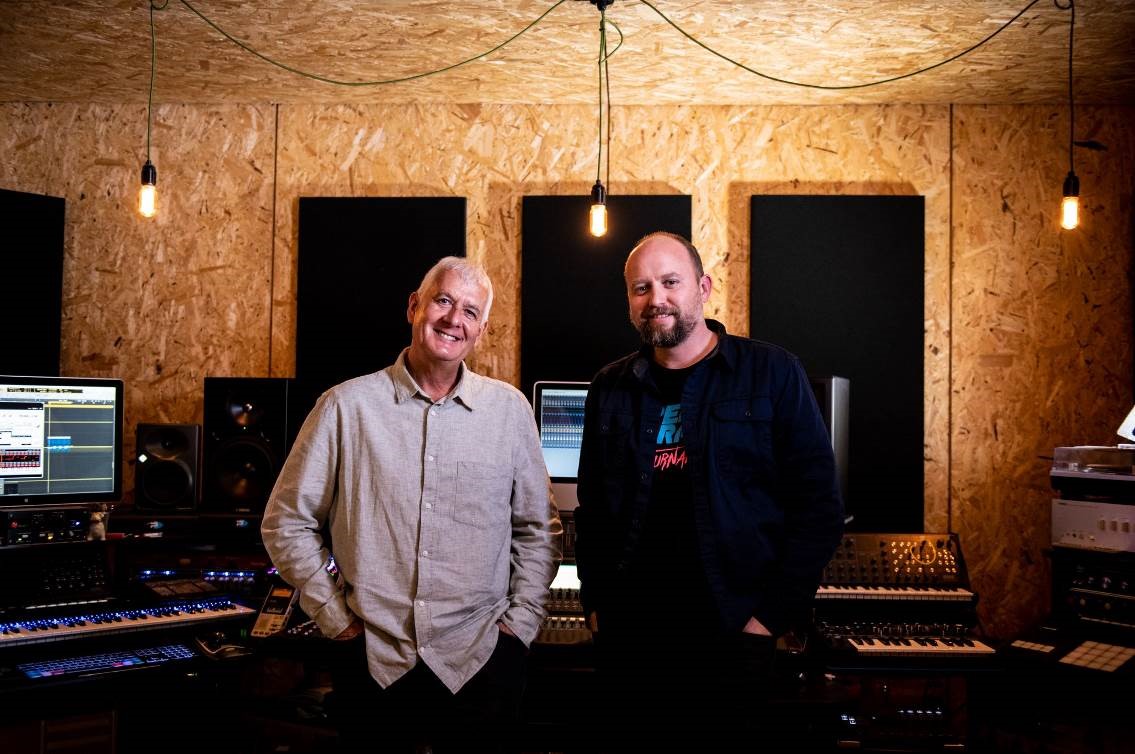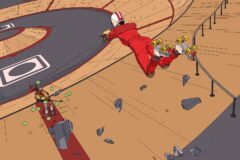What happens when a video game combines futuristic neon aesthetics with a rugby-like mix of combat and sports? You get HyperBrawl Tournament, the multiplayer barrage of colors with major esport potential that launched on iOS before coming to modern consoles this week.
But in addition to the catchy visuals and addictive gameplay, perhaps one of the most notable things about HyperBrawl Tournament is the deep and diverse soundtrack from veteran producer Steve Levine (Culture Club, the Clash). Having originally launched his career by producing dozens of major UK-based punk, pop, and new wave bands in the late 1970s and 1980s, Levine’s latest project sees the producer, composer, and label owner taking on a familiar role but in a new industry
SPIN spoke with Levine to chat about his time spent working on HyperBrawl Tournament, how it stacks up with the rest of his career, and his relationship with the game’s developers at Milky Tea Studios.
SPIN: Given your history in the music industry, how does working on a game like HyperBrawl Tournament compare with making an album for a band?
Steve Levine: Well, I think it was much, much closer to working on a movie. I think that’s the difference. When you do a movie, you sit with the director, and they have a vision for how the film is going to be. I think in this case, the game was exactly the same because they had a vision. So as a producer, it’s your job to interpret what they want. That’s why I’ve used the term more “production,” because yes, the music is composed, but so much of it is to do with the way that it sounds, the feel of it, the instruments that you use, and that’s much closer to record production than anything else.
The game certainly has a lot of the “retro-futuristic” elements of a lot of your work, so what was it like to really be able to put your stamp on a lot of the soundtrack?
I would say that the game owes more to me some of the elements on Culture Club’s first record than maybe the famous Colour by Numbers album, because by the time we went to Colour by Numbers, we had more budget, we used more things. But on the first record, some of the tracks — like “Take Control” and “White Boy” used a drum machine that’s exactly the same drum machine that’s on the game. I still own the same drum machine, and I’ve had it since 1982. On one of the things that [Jonathan Holmes, Milky Tea Studios’ Director and Founder] played for me early on, he said “I really like the drums on this. Would you be able to get something similar to that?” I said “Jon, I’ll be able to get it exactly like that because I know they used on that and I still have the same one. There were only ever 535 of those made, and I’ve got one of them.”
In the late ‘70s and early ‘80s, there was a kind of change in the way records were being made as more programming became available, and some of the synthesizer tones in the game are more from that era of my work than the late ‘80s. I’ve used similar synths since then, but I was trying to create this sort of dystopian landscape very much like that late 70s or early 80s British sound. If you think about bands like New Order, Joy Division, Depeche Mode, Orchestral Maneuvers, or Heaven 17 and the sounds of those records, they have programmed drums predominantly, a couple of guitars, and these really quirky mono synths in them. I think that’s very much what we tried to do in the game.
How did it feel to see the game come together while you were in the midst of working on the score?
It’s really, really exciting, and it’s the same thing that you get from a film. When you do a film, you often end up doing the music to a rough cut — so often when you’re doing music, you can hear someone in the background dropping a pile of plates or when it cuts from a wide shot to a close shot with a big thump and all that because it’s not been finished. So when you see the final version with all the sweetening and all kinds of tricks, it’s so lovely. The game delivered to me the same thing. They’d send me over a rough of what the arena would look like, and it wasn’t colored — or there might be a little bit here and a little bit there — so you’d get the vibe, and then they’d send it back a couple of days later with some more stuff on it. Then when you finally saw it finished, it was like, “Oh my god, this is incredible.”
Is there anything you would want people to know when they check out HyperBrawl Tournament?
I really, really want people to enjoy the game, because in this terrible, terrible lockdown, it’s an ideally suited game that you can play with other people. Obviously that wasn’t planned, but in the circumstances that we’re at, this is an absolutely ideal game for the world we’re currently in. What I’d really like people to do is enjoy the game for however long they want, but take a moment to sit back and listen to the music with a pair of headphones, because there’s some fantastic little whizbangs and things that you only hear in headphones. I’d love for people to enjoy listening on headphones to kind of take in the sounds, the echoes, the kind of bits and pieces that we spent ages and ages perfecting. Hopefully, people will enjoy it as a standalone, or as a way of kind of chilling down after playing all day.
I also want people to enjoy it because I’m very proud of the game and I’m very proud of the relationship that I have with Milky Tea. I’m always wanting to try and break new ground and do different things, and there were things on this game that were really, really exciting — and that I purchased a few things I wouldn’t have otherwise bought in order to make the game work. For example, I’ve got friends who are quite well-known British film and television composers and I was talking to them about one of the scenes in the game. I told them that the idea is that it’s kind of going back to kung fu and that kind of martial arts, and one of my friends said that he went to this shop in London called Hobgoblin, which sells lots of traditional and weird instruments from all around the world. I went into the shop, and I said to the guy that I needed to make this Japanese flute sound and that I couldn’t find any samples that are exactly right. He said “Believe it or not, there’s a guy here who plays the Japanese flute.” This guy comes over and plays it, and it’s exactly what I want, so I bought it and took it back to the studio because it wasn’t very much. Well, I nearly fainted trying to make it work, because I’ve never played one before. I thought “How hard can it be?” but it took so long to get anything out of it that was useful. So I hope people know the amount of effort that went into creating some of the things on this record.





